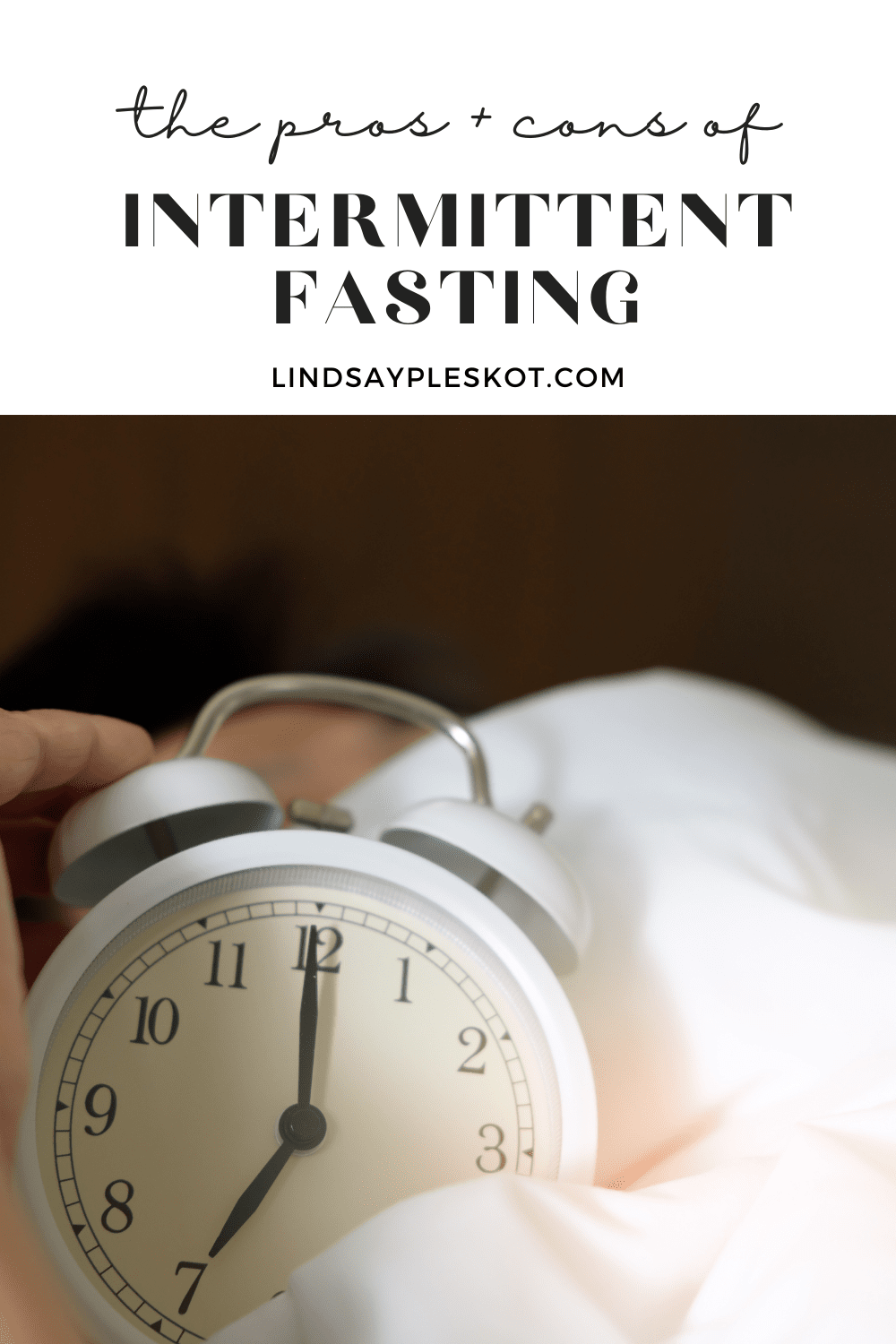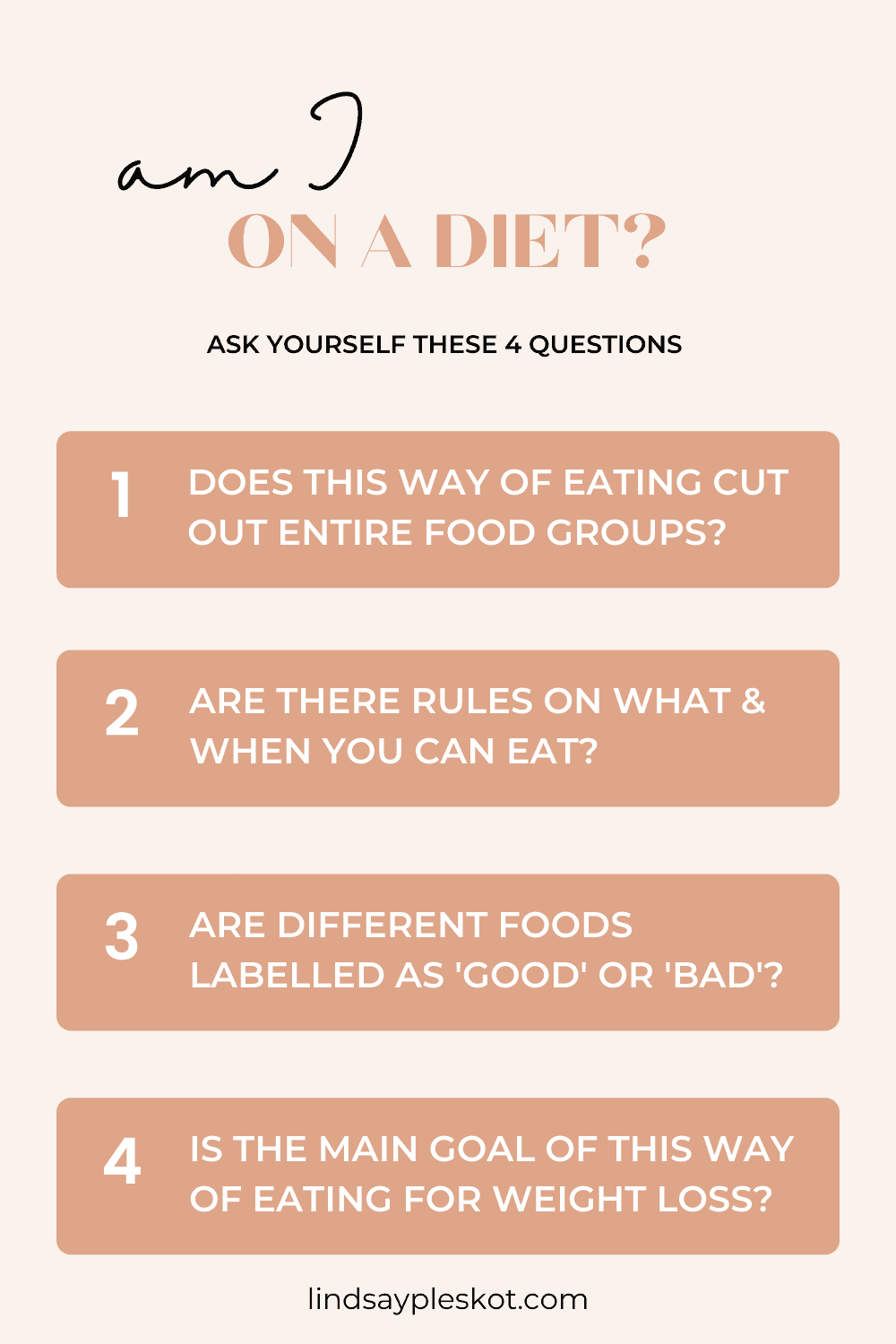It seems almost impossible to leave the house without hearing or reading the words ‘intermittent fasting’ these days, but what exactly is all the hype about? As intuitive eating dietitians, we answer all of your questions regarding what intermittent fasting is, what the pros and cons of intermittent fasting are, how to tell if intermittent fasting is a diet, and 3 alternative options.

Intermittent fasting seems to be everywhere, with influencers, celebrities, and even health care professionals making all sorts of claims on the health and weight loss benefits of intermittent fasting. But does the evidence truly hold up? As intuitive eating dietitians, we want to arm you with the facts so you can make an empowered decision.
Today on the blog, we take a deep dive into:
- What is Intermittent Fasting
- Pros of Intermittent Fasting
- Cons of Intermittent Fasting
- So is Intermittent Fasting a Diet?
- 3 Things You Can Do Instead
If you’re particularly interested in any of the above, just click the link to jump to that section!
So let’s begin.
Off the top, we often hear these questions come up time and time again:
Interestingly, women may be more susceptible to the harms of intermittent fasting than men. Intermittent fasting may negatively impact female reproductive functioning and hormone balance. Read more about that here.
We do a deep dive into the proposed benefits of intermittent fasting. While some studies suggest improved metabolic parameters and the promise of weight loss, there are many limitations to these studies. Find out what the research suggests here.
Ready to Transform Your Relationship with Food?
Explore not just what you eat but why you eat, how you feel when you eat and any patterns that affect how you feel or impact any choices you make and start your journey to food freedom today!
What is Intermittent Fasting?
Intermittent fasting, or ‘privileged starvation’ as Dr. Joshua Wolrich, author of ‘Food is Not Medicine’ refers to it as, has been touted all over the internet as the best thing since sliced bread (except you can only eat said bread at select times). What makes this diet trend stand out from the rest is that the rules are placed on when you can eat, as opposed to traditional rules around what you can eat. Essentially, you are allowed an ‘eating window’ where you can eat whatever you want, however, outside of this window you must fast.
There are many types of intermittent fasting regimes, let’s explore a few of the most common ones:
Time Restricted Method
This schedule follows a daily pattern of eating within a select window of time. A common example of this would be eating within 8 hours and fasting for 16 hours of the day.
The 5:2 Method
The 5:2 Method consists of following your normal eating pattern for 5 days out of the week with 2 days out of the week where you only consume 500 kcal/day.
Alternate Day Fasting Method
This method involves alternating between complete fasting for one day and eating as usual the next.
Religious Fasts
Many religions include fasting as part of their practice. For example, during the month of Ramadan, Muslims fast during daylight hours and enjoy a large meal at sunset and just before dawn.
Pros of Intermittent Fasting
Intermittent fasting has become very popular over the years. With the promise of weight loss, improved health outcomes, and community, it makes sense why some individuals would seek out this diet to achieve their goals. Let’s dive into some of the proposed benefits of intermittent fasting and what the research suggests.
Structure and Community
It can be comforting to follow a diet plan, especially if we are starting off in a chaotic place. Any diet, including intermittent fasting, provides structure as well as clearly defined rules on how to eat ‘the right way.’ Having rules around when you can and can’t eat can help us feel a false sense of control. Additionally, subscribing to a diet can open doors to a community of like-minded individuals who can become a source of support and companionship.
Weight Loss
With shortening the time you are allowed to eat and subsequently restricting your caloric intake, one might think that this is a sure fire way to lose weight and keep it off. But is this really true? Many studies that have been done on the weight loss effects of intermittent fasting only show weight loss in the short term (less than 2 years). As we discussed in our blog post, Why Diets Don’t Work , weight loss research suggests that up to 95% of dieters regain their lost weight within 2-5 years, with up to ⅔ regaining more weight than when they started. Additionally, a randomized control trial that was conducted in 2020, the TREAT trial, compared time restricted dieters with a control group who could eat continuously throughout the day. At the end of the trial, both groups only lost a modest amount of weight. Notably, the majority of weight lost in the time restricted dieter group came from lean muscle tissue rather than fat mass.
Improvements in Metabolic Health Outcomes
One numerously cited study that has been published in the New England Journal of Medicine suggests that fasting may reduce oxidative stress, improve insulin sensitivity (that is, how well our body responds to our hormone insulin, which allows blood sugar to enter our cells), decrease blood pressure and lower our cholesterol. However, many of these studies were done on animals and only a few small, short term human trials. While animal studies can point us in the right direction to where further research is needed, it’s not enough to make claims on how these same processes impact human physiology. Additionally, the evidence is conflicting. A review of the literature done by Paul Ernsberg, PhD, who is an associate professor in the department of nutrition and neurosciences at Case Western University School of Medicine, showed that intermittent fasting in lab and farm animals had negative effects on their metabolic parameters. These negative effects were noted to be similar to the harmful effects of weight cycling on the body in humans. An example of this seen in the research was that intermittent fasting was an effective strategy for increasing fat and marbling in farm cattle when feed was limited.
Ready to Transform Your Relationship with Food?
Explore not just what you eat but why you eat, how you feel when you eat and any patterns that affect how you feel or impact any choices you make and start your journey to food freedom today!
Cons of Intermittent Fasting
While the proposed benefits of intermittent fasting may be based on (weak) science, there may be harm with following this eating schedule, especially for women.
Impacts on Reproductive Hormones
Women may be more sensitive to caloric restriction than men. Despite what diet culture wants you to believe, the body cannot decipher between a self imposed diet and a famine. When the body senses a significant decrease in energy intake, it begins to adapt by lowering its metabolism and conserving its energy reserves. The body will begin to prioritize vital organ systems like the brain, heart, liver, and kidneys, and down regulate peripheral functioning, including the reproductive system. This can often manifest as light or skipped periods and an imbalance of female reproductive hormones, with some women experiencing hypothalamic amenorrhea (that is, a hormone imbalance related to stress and/or caloric restriction resulting in irregular or absent menstruation). While this hormone imbalance directly affects fertility, studies indicate that the impacts extend beyond reproduction, including an increased risk of bone loss and an increased risk of cardiovascular disease.
Food Obsession
While you may not be restricting the type of food you’re eating, even restricting when you can eat can cause us to hyperfixate and obsess over food. The body responds to deprivation in 3 ways. We already covered how our body responds to a famine scenario by lowering its metabolism, however we also see neurological and hormonal changes that drive us to search for food.
When faced with restriction, food becomes more rewarding and more palatable. At the same time, our hunger hormone, ghrelin, increases while our satiety hormone, leptin, decreases. All together, these biological changes in response to a diet can make us feel out of control around food.
If you’ve ever wondered ‘Why am I craving carbs?’ thinking you must have some character flaw that prevents you from sticking to a diet, the answer is NO! It’s a matter of biology, not a question of will power. We write more about how to go From Food Obsession to Food Freedom here.
Increased Risk of Disordered Eating and Developing an Eating Disorder
Along the same vein of the body being biologically wired to survive, deprivation can lead to overwhelming urges to binge. One analogy that was shared by Evelyn Tribole, RD, one of the co-founders of intuitive eating, illustrates this relationship well.
Imagine diving underwater and swimming the length of a pool. With an extended amount of time being deprived of air, your natural response would be to inhale deeply once you reach the surface. This isn’t a matter of not having the willpower to take a polite sip of air, this is a compensatory response to deprivation of a resource that is vital to our survival. In addition, dieting has been shown to be positively linked with developing an eating disorder. The National Eating Disorders Association found that 35% of dieters progress to pathological, or obsessive, dieting. Of those, up to 25% progress to meet the criteria for a diagnosable eating disorder.
Steals Our Time, Joy, and Happiness
Diets and diet culture can be described as ‘The Life Thief,’ as coined by Christy Harrison, RD, author of the book Anti-Diet. Following a strict eating regimen can negatively impact your psychological and social well-being. Having rigid rules you need to abide by can lead you to saying no to social outings that involve food, which can result in feeling socially isolated. Dieting has also been correlated with feelings of failure, social anxiety, and lowered self esteem.

So is Intermittent Fasting a Diet?
With so much information out there, you’re not alone if you’ve ever wondered ‘is intermittent fasting a diet?’ When considering if something is a diet, here are a few key points to ask yourself:
- Does this way of eating cut out whole food groups?
- Does this way of eating impose external rules on what and when you can eat, as opposed to basing it on your internal hunger and fullness signals?
- Are certain foods elevated while others are demonized?
- Is the primary goal of this way of eating for weight loss?
These questions may help you to see that intermittent fasting is in fact a diet, despite clever and dangerous marketing messages claiming otherwise.
As you begin to challenge diet culture and grapple with the idea that diets are set up to fail, we want to arm you with a tool we teach inside the Make Food Feel Good Program that we call ‘the 2 Minute Diet Decider’. This mental filter can be helpful to pull in mindfulness when you feel yourself being enticed back into a way of eating that may be a diet. The first thing you want to ask yourself when you are making decisions around your eating is:
- What is your intention?
- Are you making decisions based on your core values and how you want to feel day to day or are you basing the decision off of something you should do?
- What is the physical impact?
- Often we get enticed into a diet due to the promise of weight loss, but what we know is that 90-95% of diets fail, meaning that within 2-5 years all of that weight is gained back and up to ⅔ of those dieters regain more weight than when they started. Although diet culture sells us the idea that the next diet we try will result in lasting weight loss, what we know from the research is that dieting will most likely have the opposite effect – it is in fact one of the most common predictors of long term weight gain.
- What is the mental and emotional impact?
- If we follow these rules and restrictions, are we going to feel good about ourselves, enjoy our lives, or be present for moments and memories that really matter?
- Is this sustainable?
- The reason diets fail is because the rules and rigidity are not sustainable and we tend to see the ‘bow and arrow’ effect. This effect is where there’s been either physical or mental restriction (pulling back the bow) until eventually the bow shoots forward and we feel out of control with food or we simply cannot continue any longer.
Ready to Transform Your Relationship with Food?
Explore not just what you eat but why you eat, how you feel when you eat and any patterns that affect how you feel or impact any choices you make and start your journey to food freedom today!
3 Things You Can Do Instead
As we’ve seen, subscribing to another set of rigid dieting rules with intermittent fasting may lead to feelings of deprivation, social isolation and lasting negative physical impacts. If you’re ready to stop feeling guilty after eating and develop a healthy relationship with food, here are 3 steps to get you started:
- Begin to untangle weight from the idea of health
- There is a large body of research that supports the Health At Every Size Paradigm, which approaches health care from a weight-neutral perspective. This paradigm acknowledges that weight and shape are largely beyond our control and encourages individuals to support their health through health promoting behaviors as opposed to weight loss as the outcome. These behaviors include stress management, joyful movement, adequate nutrition, and sleep hygiene. We dive more into the reasoning behind why weight is not a good indicator of health and can actually perpetuate more harm than good in our post How to Spot Diet Culture.
- We also write about the harms of weight cycling and give you 3 ways to stop yo-yo dieting immediately here
- Let go of external dieting rules and reconnect with your own body’s wisdom
- When we try to fight and control our biology through behaviours like following rules on when we can and cannot eat or counting calories (which, by the way, don’t work), our biology will likely always win. Instead of this constant battle with ourselves, try using the hunger fullness scale to increase your attunement to when your body is asking for nourishment and when it’s had enough.
- Incorporate a mindful and intuitive eating approach
- As intuitive eating dietitians, we believe that you are truly the expert of your own body. When we learn to pull in mindfulness and pause before we react, we realize that we inherently know what the ‘right’ way to eat is for our own bodies, without needing a diet to tell us that. Essentially, mindfulness is awareness without judgment. When we increase our self awareness around our habits, we can start to decode why we might be eating and start to understand the 3 types of hunger we might be feeling. If you’re new to intuitive eating, check out our post on the 10 Principles of Intuitive Eating – What is it and is it right for you?
Now Over to You
- Have you tried intermittent fasting yourself?
- Did anything about the research on intermittent fasting surprise you?
- Any questions we missed about intermittent fasting?
Share with us in the comments below or take a screenshot and share it with us over on Instagram! And if you found this post helpful, pass it along to a friend or family member who could benefit from it too!
Looking for More Support?
Looking for support to end the diet cycle, trust your body and learn the nutrition that feels amazing for YOU? Learn more about my Make Food Feel Good Program here where hundreds of women have found lasting success through my proven framework and step-by-step guided support. Let’s Chat!









Leave a Comment & Rate this Recipe